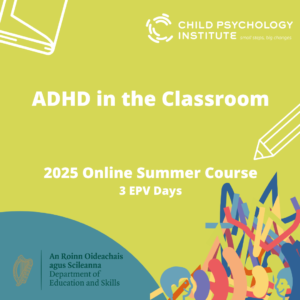Understanding how depression impacts children, how this presents and how professionals can support children with depression
Course Approved By The Department Of Education And Skills
- 10 hours on-demand video material and 10 hours offline learning
- Online tutor moderation
- Downloadable articles and resources
- Access on mobile and desktop
- Department of Education and Skills-Accredited Summer Course Certificate 2025
- Full access to the course
According to the HSE, 1 in 4 children may experience depression before entering adulthood. Depression in childhood may present as low mood, lack of interest, poor appetite and reduced social interactions, for example. At CPI, we believe that teachers have a great opportunity to notice when students’ interests, activity levels and socialisation have changed because they can compare it to the norm for that child. Issues may also be arising from the home environment, which might mean other factors are at play that can impede children from discussing their issues with their parents. And while many teachers can be concerned about their students’ emotions or behaviours, there is a gap in Ireland in terms of what happens next.
In a social scape where support is not always readily available, we at CPI believe it’s vital that teachers feel confident in their approach to these children. There is a fear we ourselves can’t handle the situation or we may not know the right thing to say – on this course, we will showcase exactly what these children need and you will learn how to support your students…but more importantly, you will learn why they need someone just like you to see them!
Many children who suffer from depression, low mood and low self-esteem also engage in acts of self-harm. As recently as 2019 in Ireland, 561 children aged 10 to 14 years presented to Irish Emergency Departments following acts of self-harm (Griffin et al., 2019). There is evidence from clients within CPI that children as young as 4 are also self-harming, and there are reports from doctors, schools and CAMHS that acts of self-harm which do not require emergency department care are on the rise. This is worrying because Bennardi et al (2006) has shown that these children who engage in acts of self-harm are more at risk of suicide.
Supporting children with depression is not the plight only of social workers, psychologists or doctors. For many children, they don’t have the support of allied health professionals and there is so much that can be done by teachers to foster an environment which is calm, compassionate and open. Being aware of children’s issues means that we can intentionally say and do the right things instead of unintentionally saying and doing the wrong thing. We can promote community in the class-group, enhance emotional literacy and make students feel like they matter, they’re valued and they are seen and heard.
We can be that one safe secure adult that some children don’t naturally have in their lives.
We can be the person who sees the communication behind the behaviour.
We can be the difference!
This course is ten hours of audio content, visual content and assessment in total, and there are ten hours of recommended reading and resources for you to further develop your own learning.
You may also like…
-
2025 Summer Courses
2025 Summer Course: ADHD in the Classroom
€99.00 Select options This product has multiple variants. The options may be chosen on the product page -
2025 Summer Courses
2025 Summer Course: Designing Inclusive Learning Environments with STEM Activities
€99.00 Select options This product has multiple variants. The options may be chosen on the product page -
2025 Summer Courses
2025 Summer Course: Working With Children With Dyspraxia
€99.00 Select options This product has multiple variants. The options may be chosen on the product page -
2025 Summer Courses
2025 Summer Course: Working With Children With Depression
€99.00 Select options This product has multiple variants. The options may be chosen on the product page -
2025 Summer Courses
2025 Summer Course: Working With Children Who Have Experienced Trauma
€99.00 Select options This product has multiple variants. The options may be chosen on the product page -
2025 Summer Courses
2025 Summer Course: First Class Fundamentals In Association With Muinteoir Valerie
€99.00 Select options This product has multiple variants. The options may be chosen on the product page -
2025 Summer Courses
2025 Summer Course: Working With Children With Anxiety
€99.00 Select options This product has multiple variants. The options may be chosen on the product page












